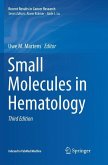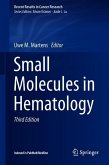This book, written by respected experts, discusses in detail the latest developments in targeted oncology therapy using small molecules. It covers a wide range of small molecules, including tyrosine kinase inhibitors, mTOR, MEK, PARP, and multikinase inhibitors, as well as cell cycle and NTRK interacting agents. For each molecule, aspects such as the chemical structure, mechanism of action, drug targets, drug interactions, preclinical studies, clinical trials, treatment applications, and toxicity are discussed.
Extensive research into the molecular mechanisms of cancer has heralded a new age of targeted therapy. The field of personalized cancer therapy is now growing rapidly, and the advances being made will mean significant changes in the treatment algorithms for cancer patients. Numerous novel targets that are crucial for the survival of cancer cells can be attacked by small molecules such as protein tyrosine kinase inhibitors. This book is the third edition of Small Molecules in Oncology, but has now been divided into two volumes, with the other volume focusing specifically on small molecules in hematology.
Extensive research into the molecular mechanisms of cancer has heralded a new age of targeted therapy. The field of personalized cancer therapy is now growing rapidly, and the advances being made will mean significant changes in the treatment algorithms for cancer patients. Numerous novel targets that are crucial for the survival of cancer cells can be attacked by small molecules such as protein tyrosine kinase inhibitors. This book is the third edition of Small Molecules in Oncology, but has now been divided into two volumes, with the other volume focusing specifically on small molecules in hematology.








